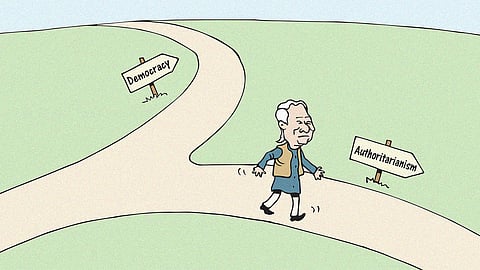India descends to warmongering after Pahalgam – Southasia Weekly #66
This week in Himal
We’re just 13 new Patrons short of reaching our target of 38 Patrons for 38 years to mark the 38th anniversary of Himal Southasian this May. Click here to join our Patron programme and help us on our way. We have a special surprise coming up at the end for all new Patrons who come aboard in May – so become a Patron today!
This week, Rahul Rao writes about India’s near-complete surrender to war lust in the wake of the Pahalgam attack. Kashmir has receded from view in the wake of the belligerent rhetoric employed by the ruling BJP with few other opposition parties offering a counterpoint, he writes.
Don’t miss Auqib Javeed's story on how residents of Kashmir protected tourists and protested against the Pahalgam violence - but are still being subject to retaliatory attacks, assault and harassment.
For the next episode of the Southasia Review of Books podcast, host Shwetha Srikanthan speaks with author Thomas Bell about Human Nature, which follows the author on four walks through the Himalaya, blending folklore, literature, art and anthropology to offer a walking history of the Himalayan landscape.
This week in Southasia
Bangladesh’s interim government bans the Awami League
On 12 May, Bangladesh’s Elections Commission cancelled the registration of the Awami League party, effectively barring it from contesting in the next national elections. The decision came hours after the interim government issued an official notification banning all activities of the Awami League under the Anti Terrorism Act. The ban would last until the trial of the party and its leadership over the death of hundreds of protesters during the July 2024 uprisings that ultimately led to the removal of Sheikh Hasina as prime minister, the interim government said.
While Hasina’s regime was marked by violent authoritarianism, with elections often marred by allegations of vote-rigging and other irregularities, the new interim government is facing growing criticism. Tasked with introducing legal reforms to allow for the peaceful transfer of power, the interim government announced an amnesty for student protesters and has downplayed revenge violence targeting Awami League supporters. In February, a fresh bout of violence erupted after Hasina said she would address Bangladesh from India. The head of the interim government, Muhammad Yunus, has yet to set a date for elections due to ongoing reforms, and is facing growing pressure from the Bangladesh Nationalist Party who stands to benefit the most from swift elections.
Two recently released reports from the United Nations and Human Rights Watch confirm the Awami League’s responsibility for the death of thousands of protesters, but also warns Bangladesh’s interim government from replicating the poor practices of the previous regime, which will mar any transitional justice process and may allow the winners of the next election to continue in the vein of their predecessors. Cyrus Naji’s article from February 2025 laying out the content of these reports is worth revisiting in the light of the Awami League ban.
From the archive (February 2025)

